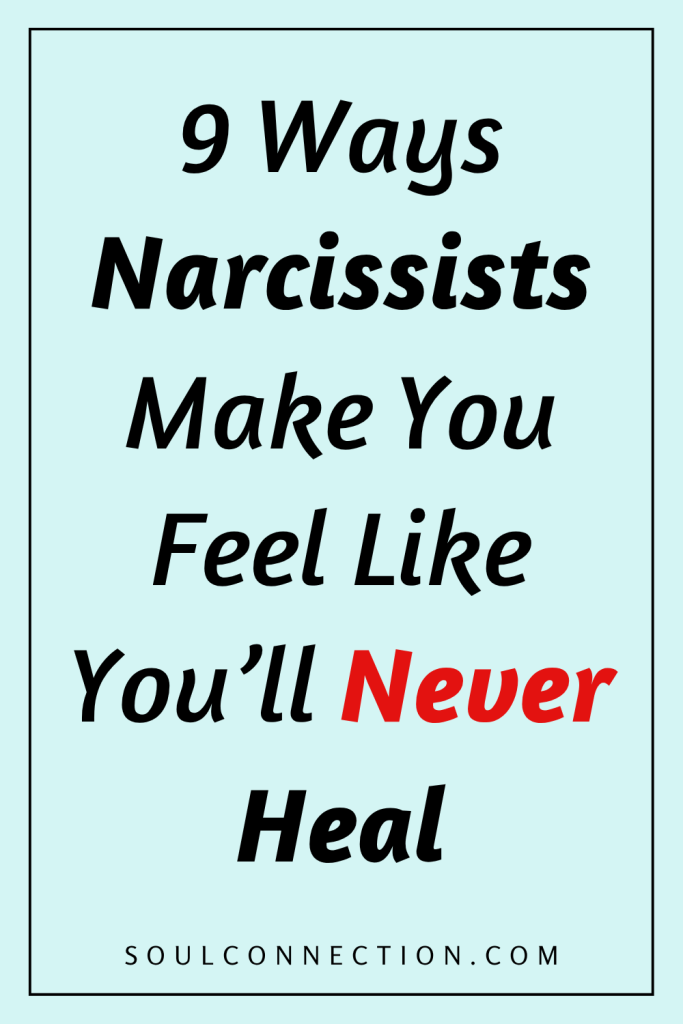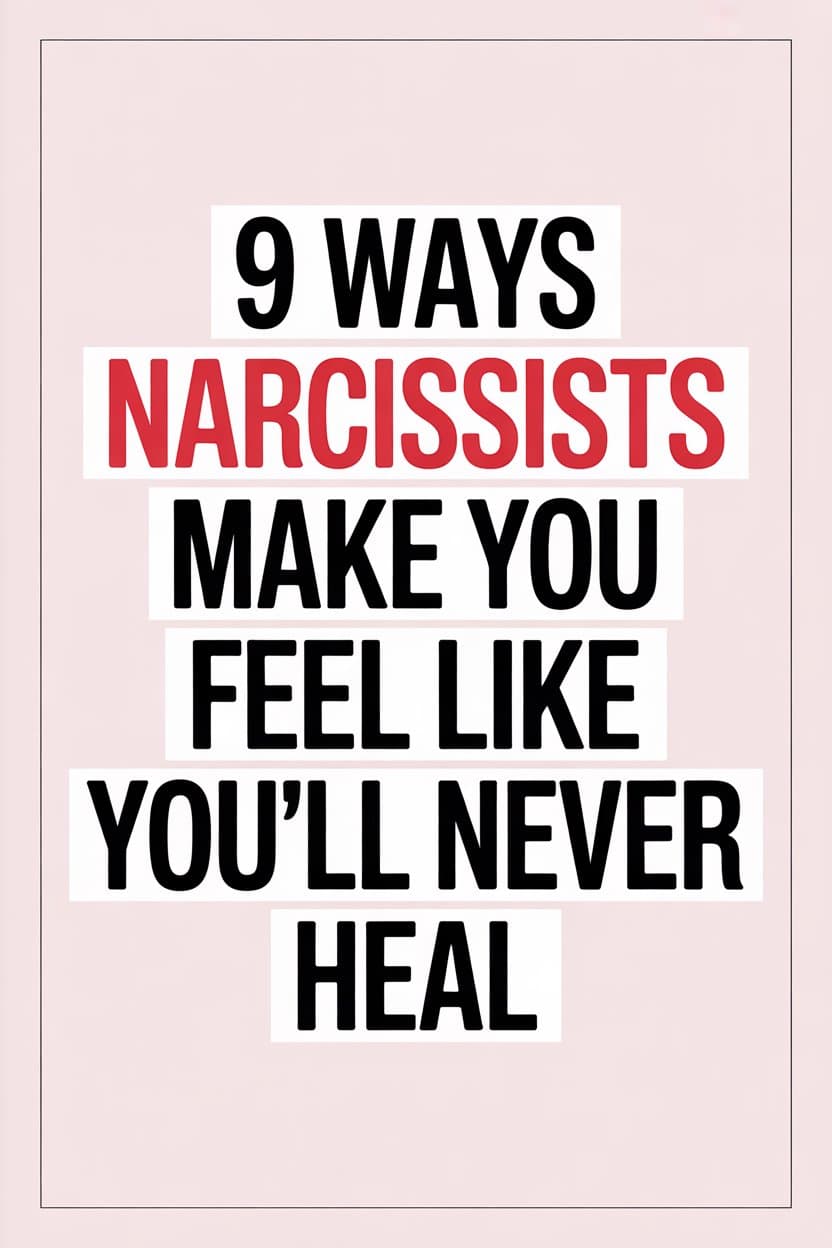So, you’ve had the misfortune of loving a narcissist.
Maybe you’re out, maybe you’re still in, or maybe you’re just circling, wondering how on earth you got here—with your self-esteem in tatters and your sanity questioning its own sanity.
Welcome. Pull up a chair. The drinks are imaginary, but the validation is very real.
Ever wondered why healing after a run-in with a narcissist feels more complicated than assembling flat-pack furniture with the instructions in Swedish?
It’s not you. It’s not even IKEA. It’s the invisible tricks and psychological traps narcissists set that make moving on feel impossible.
Here’s how these emotional escape artists keep you doubting that you’ll ever feel whole again—and what to do about it.
1. Gaslighting Until You Doubt Your Own Name
Ah, gaslighting—the Olympic sport of narcissists everywhere. Suddenly, you can’t trust your memory, your gut, or the fact that you did, in fact, put the milk in the fridge and not the linen closet.
Gaslighting works by gradually eroding your sense of reality. After enough, “That never happened,” or, “You’re so sensitive,” you might start to believe you’re the problem.
The end result? Questioning every feeling and memory you have, which makes healing feel about as likely as finding a unicorn in your backyard.
How to fight back: Document things for yourself—texts, emails, even a petty little journal. The act of collecting receipts may feel overkill, but it’s actually a lifeline back to your reality.
2. Smothering, Then Withholding Affection
Love-bombing is thrilling—until it isn’t. Out of nowhere, the praise and gifts dry up, and you’re left in an emotional desert, parched and desperate for the next breadcrumb.
Narcissists train you to crave their approval, and when it’s gone, you feel hollow. It’s a pattern that messes with your brain’s reward system, making healing feel impossible.
You’re left replaying the early days, wondering what you did to ruin it.
How to fight back: Notice the pattern. The affection wasn’t about you—it was about control. Soothe yourself the way you wish they would: movie night, comfort food, or texting a sane friend.
3. Turning Everyone Into an Unpaid Private Investigator
Ever found yourself explaining, justifying, or defending yourself to friends who used to know you better? Narcissists are masterful at rewriting history, spinning tales, and recruiting flying monkeys to spread their gospel.
Suddenly, you’re not only wounded but also fighting a PR war. The world feels hostile. Healing gets put on hold while you try to untangle your reputation from the narcissist’s tall tales.
How to fight back: Stop the press tour. True friends won’t need a dissertation. Invest your energy in people who’ve known your character longer than the narcissist has known your weaknesses.
4. Keeping You Hooked With Apologies That Mean Nothing
“Sorry if you felt that way,” is the narcissist’s favorite genre of apology. It’s just enough to keep you hopeful, but not enough to create real change.
This cycle of hurt, apology, honeymoon, repeat, is a psychological merry-go-round that leaves you dizzy and doubting your own boundaries.
Why can’t you just move on? Because you’re still waiting for the apology that matters.
How to fight back: Recognize that real apologies come with changed behavior—not just crocodile tears. Write the closure letter you’ll never send. Toast to your own growth.
5. Weaponizing Your Vulnerabilities
Remember that thing you told them on a rainy night, thinking you were safe? Narcissists remember, too. Only, they use it as ammo when convenient.
Being attacked where you’re most vulnerable is a special kind of betrayal. It teaches your brain that openness equals pain, so you shut down. Healing? It’s hard to start when your guard is always up.
How to fight back: Reclaim your story. That sensitive thing isn’t a weakness, no matter how they twisted it. Find safe spaces—therapy, trusted friends—where vulnerability is valued, not weaponized.
6. Rewriting History To Paint Themselves as the Victim
Narcissists love a dramatic rewrite. Suddenly, they’re the ones who suffered, and you’re the villain. If you dare to speak up, you’re accused of being “crazy,” “unstable,” or—my personal favorite—“toxic.”
This emotional whiplash confuses anyone’s healing journey. You start to wonder if maybe you were the problem. (Spoiler: you weren’t.)
How to fight back: Stick to the facts. Share your experience with those you trust, not for their approval, but to remind yourself that your reality is valid.
7. Isolating You From Support
Trips with your friends start to feel like negotiating Brexit. Phone calls with family? Met with suspicious glares. The narcissist wants you to believe they’re the sun, and everyone else is just distant planets.
Isolation means no one is there to reality-check the nonsense. This loneliness deepens your wounds and extends the recovery timeline.
How to fight back: Reconnect with your humans. Start small—send a meme, grab a coffee, comment on a photo. Your support system misses you, even if they’ve been kept at arm’s length.
8. Making Every Problem Your Fault
Lost keys. A bad mood. The price of petrol. Narcissists have a unique talent for blaming you for problems both large and microscopic.
This relentless blame game wears you down, convincing you that you’re inherently defective. Self-blame is the slow poison that keeps you stuck, re-examining your every move.
How to fight back: Spot the pattern. No one is responsible for everything. List the things you are responsible for, and cross out everything that isn’t on that list.
Spoiler: petrol prices aren’t your fault.
9. Giving You Hope, Then Pulling the Rug
Just when you’re ready to pack your emotional bags, they turn on the charm. Suddenly, there’s a promise of change—therapy, communication, maybe even flowers if you’re lucky.
This intermittent reinforcement is addictive. Your brain starts to crave the rare good times, clinging to hope even as your reality sours. You heal for a day, then get shoved back to square one.
How to fight back: Notice when you’re living on crumbs. Hope is beautiful, but false hope keeps you chained. Plant your feet in reality. Healthy love doesn’t require acrobatics.
Healing Is Messy, But It’s Possible
Stumbling out of a narcissist’s orbit can feel like waking from a fever dream. One minute you’re confident, the next you’re convinced you belong in a padded room.
But every time you question your worth, remember: that’s part of the narcissist’s legacy, not your truth.
Give yourself permission to grieve the good times, rage at the gaslighting, and reclaim the pieces of yourself that got lost in the drama. Healing won’t be linear.
Some days you’ll feel on top of the world; other days, you’ll wonder if you’ve made any progress at all.
Ring your mates. Hug your dog. Have a moan, binge some questionable telly, or write angry letters you’ll never send.
The narcissist may have made you feel like you’ll never heal, but feelings aren’t facts. Your scars might stick around, but so does your strength—and that’s something they can’t touch.


